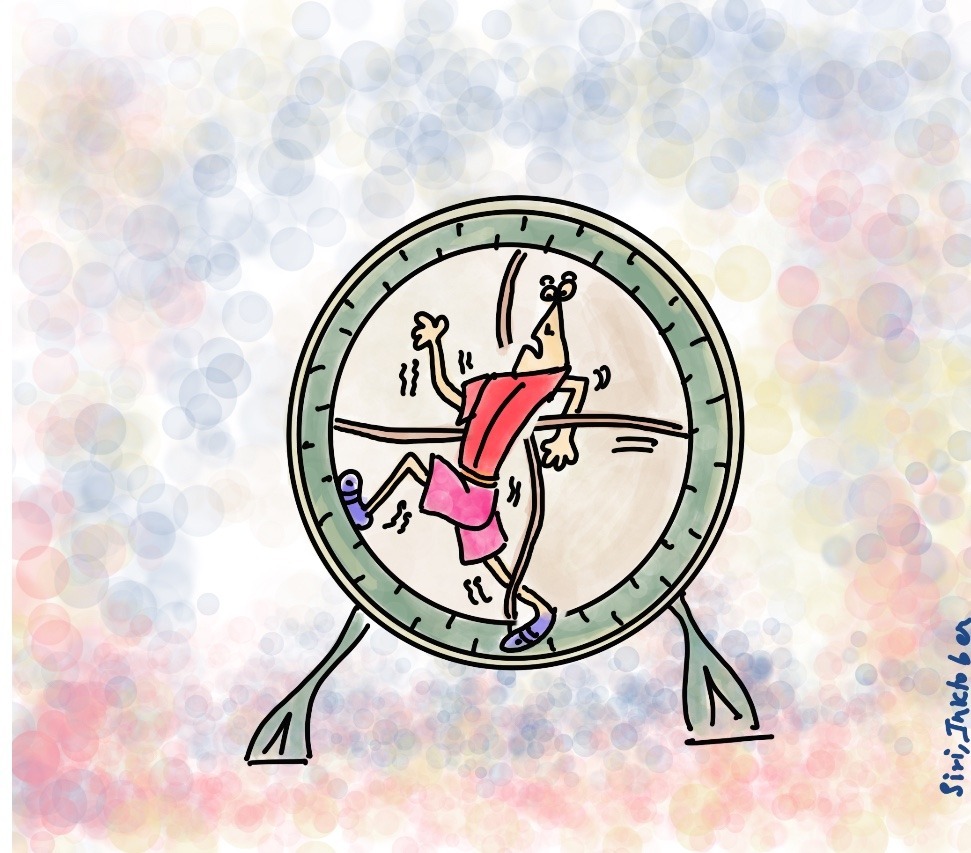In my one year working for myself, I found something surprising. I am not busy.
This realization struck me as odd because, for most of my corporate career, I wore busyness like a badge of honor. Packed calendars, back-to-back meetings, endless email chains, urgent requests that somehow all seemed equally important. This was the rhythm of professional life I had known.
But now, working independently, I've discovered something profound: being productive and being busy are often inversely related. The less busy I became, the more meaningful work I accomplished.
This isn't just a personal observation—it's a trap that millions of professionals fall into daily. We mistake motion for progress, confusing the feeling of being busy with the reality of being effective. Like hamsters on a wheel, we're expending tremendous energy while going nowhere.
The Validation We Get from Being "Busy"
Let's be honest about something: being busy feels good. There's a dopamine hit that comes with checking items off a to-do list, even if those items don't move us toward our larger goals. In many workplace cultures, visible busyness has become synonymous with value and dedication.
Consider how we respond when someone asks, "How are you?"
"Oh, you know, super busy!" we reply, with a mixture of exhaustion and pride.
This response has become so common that saying "I'm doing well, and I have plenty of time" almost sounds irresponsible or unambitious. We've created a culture where busyness is our primary identity and our default excuse for not pursuing what truly matters.
But here's the uncomfortable truth: busyness is often a sophisticated form of procrastination. It allows us to feel productive while avoiding the harder, more important work that requires deep thinking, creativity, and risk-taking.
The Lack of Gatekeeping
One of the biggest contributors to the busy work trap is the absence of effective gatekeeping: both external and internal.
External Gatekeeping
In many organizations, there's no filter for what constitutes important work versus busy work. Requests flow freely from multiple directions:
- Your manager asks you to analyze data that may never be used
- A colleague needs help with a project that's peripherally related to your role
- HR requires you to complete training that has little relevance to your actual job
- Cross-functional teams invite you to meetings where your input isn't actually needed
Without clear priorities and boundaries, every request feels urgent, and saying no feels impossible.
Internal Gatekeeping
Even more problematic is our own lack of internal gatekeeping. We often fail to ask ourselves crucial questions:
- Does this task align with my key objectives?
- Will completing this move me closer to my goals?
- Is this the best use of my time right now?
- What will I stop doing to make room for this new request?
Without this internal filter, we become reactive rather than strategic, letting external demands dictate our priorities rather than making conscious choices about how to spend our time and energy.
Three Consequences of the Busy Trap
1. No Time for Future-Proofing Your Skills
When you're constantly responding to immediate demands, you have no time to invest in learning new skills, exploring emerging trends, or developing expertise that will be valuable in the future.
Think about it: when was the last time you spent significant time learning something that wasn't directly required for an immediate task? When did you last read industry reports, take a course, or experiment with new tools simply to expand your capabilities?
This creates a dangerous cycle. The busier you become with today's work, the less prepared you are for tomorrow's opportunities. You become increasingly valuable at outdated skills while missing the chance to develop capabilities that could transform your career.
2. De-training Your Attention Muscles
Constant task-switching and multitasking don't just make you less efficient, they actually rewire your brain to have a shorter attention span and reduced ability to focus deeply.
Research by Dr. Sophie Leroy at the University of Washington has shown that when you switch from Task A to Task B, part of your attention remains stuck thinking about Task A. This phenomenon, called "attention residue," means that the more you switch between tasks, the less mental capacity you have available for any single task.
Over time, this constant switching becomes habit. Your brain becomes accustomed to shallow work and loses the ability to sustain the deep focus required for complex problem-solving, creative thinking, and strategic planning: the very capabilities that distinguish high performers from busy performers.
3. Chronic Stress and Decreased Well-being
The busy trap creates a state of chronic stress that affects both your performance and your health. When you're constantly reacting to urgent demands, your nervous system remains in a state of hypervigilance.
This chronic activation of your stress response leads to:
- Reduced creativity and problem-solving ability
- Impaired decision-making and judgment
- Decreased emotional regulation
- Physical symptoms like headaches, insomnia, and digestive issues
- Increased risk of burnout and mental health challenges
Ironically, the more busy work you take on to prove your value, the less capable you become of delivering your best work.
Escaping the Busy Trap
Breaking free from the busy work trap requires both strategic thinking and tactical changes:
Start with Clarity
Before you can eliminate busy work, you need to be crystal clear about what constitutes important work. This means:
- Understanding your role's key performance indicators
- Knowing which activities have the highest impact on your goals
- Identifying the work that only you can do
- Clarifying what success looks like in your position
Implement Ruthless Prioritization
Once you have clarity, you need systems for maintaining focus:
- The 80/20 Rule: Identify the 20% of activities that generate 80% of your results, and protect time for these activities
- Time Blocking: Schedule specific blocks of time for important work and treat them as unmovable appointments
- The Two-Minute Rule: If something takes less than two minutes, do it immediately. If it takes longer, schedule it or delegate it
- Regular Reviews: Weekly or monthly reviews of how you're spending your time versus your priorities
Develop Your "No" Muscle
Learning to say no gracefully is perhaps the most important skill for escaping the busy trap:
- "I'd love to help with this, but I'm currently focused on [priority project]. Could we revisit this in [specific timeframe]?"
- "This sounds important. Help me understand how it aligns with [shared objective] so I can prioritize appropriately."
- "I can't take this on right now, but have you considered [alternative solution/person]?"
Redefining Your Career Path
Perhaps most importantly, escaping the busy trap requires redefining what career success means to you. Instead of measuring your worth by how many hours you work or how full your calendar is, consider measuring it by:
- The impact and quality of your contributions
- The value you create for your organization and clients
- The skills and expertise you're developing
- The meaningful relationships you're building
- The balance between professional achievement and personal fulfillment
This shift in perspective isn't just about productivity, it's about reclaiming agency over your professional life. When you stop being reactive and start being intentional about your choices, you don't just become more effective; you become more fulfilled.
The goal isn't to eliminate all busy work overnight, that's neither realistic nor necessary. The goal is to gradually increase the ratio of important work to busy work, making conscious choices about how you spend your time and energy.
Remember: you can be busy or you can be effective, but rarely both. The choice is yours, but making it requires the courage to step off the hamster wheel and start moving in a direction that truly matters.
Your future self will thank you for making that choice today.
Ready to create the life you've always envisioned?
Book a free discovery call and start your journey with personalized coaching.


